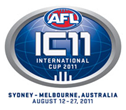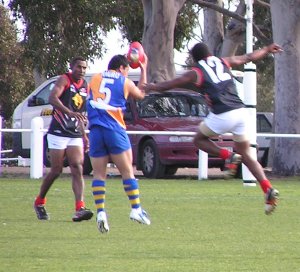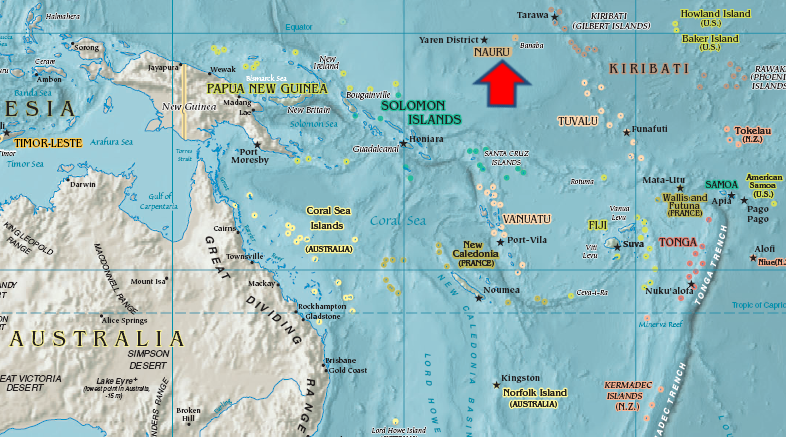IC11 Preview - Chiefs Aim to be Kings
- Friday, July 29 2011 @ 10:48 pm ACST
- Contributed by: Rod Shaw
- Views: 5,279


Nauru is a tiny Pacific Island nation that has the distinction of being the only country in the world that has Australian Rules as its national sport (assuming that status is disputed/shared by several sports in Australia). The capital city is Yaren and the population is just 12,000 but the number of Australian football participants is 300.
The the national team is known as the Nauru Chiefs and they are returning after a superb 2008 International Cup.
Road to the International Cup
Nauru’s preparation for the 2011 International Cup started in 2009 when football competition on Nauru was revived after a violence induced hiatus. Riding on the good result by the Chiefs at the 2008 Cup the competition was revamped. Six special teams were formed and players were recruited and allocated evenly to each team in a draft. Two competitions were conducted in 2009 – a pre season competition from March to May and the main Premiership Season running from August to October to establish a good foundation for the revival of football on Nauru.
The 2010 Premiership season attracted 180 registered players, getting a chance to play in two rounds of competition which involved ten weeks of exciting matches and one week of finals playoff. Young players had further incentive of trying out for a spot in the Chiefs squad aiming to participate at the Oceania Cup in New Zealand in December. A squad was named in November but unfortunately lack of funds and priority in focusing on the 2011 International Cup prevented the Chiefs going to Auckland. Nevertheless the squad went through an intensive preseason training program over the Christmas period.
The 2011 Premiership season started early to allow more time preparation for the Chiefs’ preparation for the IC11 and competitions started in February with finals played off on Saturday April 30. The next day, Sunday May 1, the 2011 Nauru Chiefs Squad was selected. Graham Pratt from Bendigo was nominated as the new coach. 2008 coach Wes Illig from Stawell was retained as Assistant Coach.
The Squad then underwent further training program from May to June, and on Wednesday July 6, the bulk of the team travelled to Australia where they will complete their lead up to the International Cup by playing with various football clubs in country Victoria. A similar arrangement in 2008 was thought to be vital in their great run.
Four players are at the Maryborough FC in the Bendigo FL with all playing reserves currently, however Bendigo is an extremely good standard competition. Two are at the Bridgewater FC, in the Loddon Valley FL, with both playing reserves but going well and hopeful of playing seniors soon. Other players are at Stawell, Rupunyap and the Stawell Swifts. Three players are in the strong Wimmera League with Stawell, six are in the Horsham District League with three of those at Rupanyup and the other three at the Stawell Swifts. All six players at Rupanyup and Stawell Swifts have played senior footy in the last two weeks and have had an impact at some level. Stawell have had two in the seniors and one consistently in the best in the seconds. A further two U/18 players are currently playing in a Brisbane based U/18 competition as well. Coach Graham Pratt added “A special mention to all the clubs who have contributed so much in looking after these players.”
That is 17 of the squad in total playing weekly in Australian competitions and that is a preparation that leaves the Nauruans second to none. The effort to arrange all this exposure cann't be under-estimated and has been first class.
The Country and Australian Football
Nauru is an island nation in Micronesia in the South Pacific. Its nearest neighbour is Banaba Island in Kiribati, 300 kilometres (186 mi) to the east. Nauru is the world's smallest island nation, covering just 21 square kilometres (8.1 sq mi). With just over 9,265 residents, it is the second least-populated country after Vatican City. Settled by Micronesian and Polynesian people, Nauru was annexed and claimed as a colony by the German Empire in the late 19th century. After World War I, Nauru became a League of Nations mandate administered by Australia, New Zealand, and the United Kingdom. Nauru gained its independence in 1968.
Nauru is a phosphate rock island, with deposits close to the surface, which allow for simple strip mining operations. This island was a major exporter of phosphate starting in 1907 until the deposits ran out during the 1980s. The island also benefited financially when it was an off-shore detention centre for illegal immigrants into Australia for a period recently.
Football was first played by Nauruan schoolchildren in the 1930’s in schools in Victoria, Australia. Among these schoolkids was Hammer DeRoburt. Schools in Geelong and Melbourne in Victoria were popular destinations of Nauruan schoolchildren of secondary-school age. After DeRoburt left Australia, he headed back to Nauru with a couple of friends and popularised the sport in his hometown. Whilst the phosphate mining continued Aussie ex-pats helped to keep the competition alive and prospering.
Internationally Nauru first participated in the 1995 Arafura Games in Darwin, Australia. The team, coached by former VFL/AFL player Mark Yeates finished third, winning the Bronze medal. In 2000, the Chiefs travelled to Queensland to compete in the inaugural Web Sports Cup to compete against teams from Samoa and the Robina Roos from Australia. The Chiefs won both matches. In 2001, the Chiefs again travelled to Queensland winning another two matches, one against the Gold Coast Old Boys. In the same year the Chiefs won the gold medal at the 2001 Arafura Games, defeating the Japanese national side.
At the AFL International Cup in 2002, the Chiefs finished in 8th place, ranking Nauru the 9th strongest Aussie Rules nation in the world. Nauru withdrew from the 2005 International Cup. They attended the 2008 event however due to intense rivalry and violence in the National League, the NAFA (Nauru Australian Football Association) placed strict conditions on player eligibility to encourage a sense of unity, meaning that only players under 23 years old with a clean record were able to represent Nauru in the Cup. A number of members of the national team were placed with clubs in country Victoria to spend a few months developing their skills before the tournament. The team performed exceptionally, being beaten once in the opening pool round by the eventual winners Papua New Guinea, their only loss, to place 5th overall.
Strengths and Weaknesses
Strengths must include the football preparation accorded to the majority of the squad in playing football regularly in Australia. The fact that footy is the number one sport in Nauru also bodes well as does the Nauruans previous efforts at the Cup. Finishing ninth in 2002 where their only win was over Japan though they were competitive in all further matches against Great Britain, Denmark, PNG and Samoa they improved significantly in 2008 despite taking a squad with age restrictions. They thumped Great Britain and destroyed the Peace team in the pool matches before then easily defeating the USA and Canada to claim fifth place.
In this author’s opinion height must be a challenge although coach Pratt had this to say “I believe we have a little more height across the group this time. With the experience of the 2008 Cup and the benefits of the support from the billeting clubs we will be looking to put up an even better showing this campaign”. Assistant Coach Wes Illig added “all players stand out because of their low centre of gravity and the general carnage left behind them after they have hit the football. We will not have any 6 footers but as the ball is played on the ground 99% of the time height is not all it is cracked up to be and if you have 20 blokes having a go, leaving a physical trail of destruction behind them, teams tend to lose concentration of their game plans and structure”. Further to that as the previous coach in 2008 he said “The biggest difference this time round is that they boys have been playing footy for three years (as opposed to two years with no footy at all) and the quality of football and individual skill has increased markedly”.
Players to Watch
- Otto Adam - March 11, 1989, 168cm, 83kg (Dolphins Football Club). Otto is a tough onballer who has special ability to read the play, has good disposal skills on both sides. Played in 2008 team.
- Johnny Dagiaro - September 11, 1988,175cm, 84kg (Stingrays Football Club). Johnny is a tough utility player, can play on taller opponents, is a strong mark, accurate user of the ball, member of the South Pacific team that played for the Pacific Forum leaders in Cairns in 2009.
- Yoshi Harris - February 20, 1994, 182cm, 89kg (Skipjacks Football Club). Yoshi is capable of mixing it with the older guys, has international experience in the junior ranks and this is his first test in the senior ranks. He has accepted a scholarship from the Great Western Sydney Giants.
Form Guide and Bottom Line
Eighth in 2002, fifth in 2008, Premiers in 2011? In this author’s opinion that is a possibility though it is more likely that a top 4 finish would be a fine result. Ranked sixth in the world in the World Footy News Rankings and seeded fifth at the tournament we will leave the last word for Pratt “The Our Airline Nauru Chiefs are coming so look out world!’”



 RSS news
RSS news Twitter
Twitter Facebook
Facebook